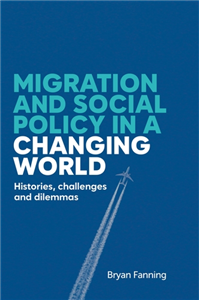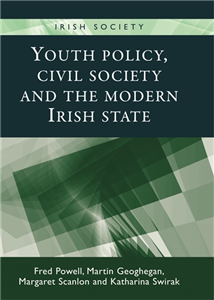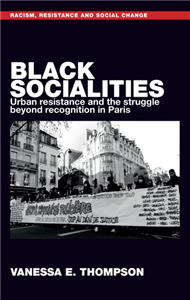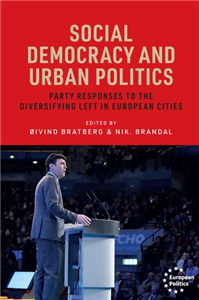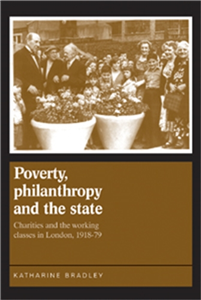Your Search Results
-
RANOK Corporation
Ukrainian Publishing House “RANOK” founded in 1997 is prominent for its endless love for books and reading.
View Rights Portal
-
Promoted ContentOctober 2004
Corporate Social Responsibility.
Das Ermessen des Managements zur Berücksichtigung von Nichtaktionärsinteressen im US-amerikanischen und deutschen Aktienrecht.
by Empt, Martin
-
Promoted ContentHumanities & Social SciencesJanuary 2026
Migration and social policy in a changing world
Histories, challenges and dilemmas
by Bryan Fanning
Migration and social policy in a changing world bridges the generally separate fields of social policy and migration studies. This book traces social policy responses to migration from the Industrial Revolution to today's era of globalisation and large-scale migration. Through case studies from across the globe, the book explores key themes including rural-urban migration, social citizenship, welfare internationalism and diasporic care systems. It examines how migrants are included in or excluded from social citizenship in host societies, and how they become providers of welfare services such as health and social care. Moving beyond a methodological nationalist focus, the book investigates migrant incorporation into welfare states through family networks, faith communities, and other informal welfare structures. It combines migrants' experiences with host societies' immigration politics, institutional perspectives and policies to present a comprehensive analysis of the migration-welfare relationship. This volume fills a gap in academic literature and offers policymakers, practitioners and scholars a framework for understanding the interplay between migration and social policy in our changing world.
-
 Trusted Partner
Humanities & Social SciencesOctober 2023
Trusted Partner
Humanities & Social SciencesOctober 2023The illusion of the Burgundian state
by Élodie Lecuppre-Desjardin, Christopher Fletcher
On 25 January 1474, Charles the Bold, duke of Burgundy, appeared before his subjects in Dijon. Robed in silk, gold and precious jewels and wearing a headpiece that gave the illusion of a crown, he made a speech in which he cryptically expressed his desire to become a king. Three years later, Charles was killed at the battle of Nancy, an event that plunged the Great Principality of Burgundy into chaos. This book, innovative and essential, not only explores Burgundian history and historiography but offers a complete synthesis about the nature of politics in this region, considered both from the north and the south. Focusing on political ideologies, a number of important issues are raised relating to the medieval state, the signification of the nation under the 'Ancien Regime', the role of warfare in the creation of political power and the impact of political loyalties in the exercise of government. In doing so, the book challenges a number of existing ideas about the Burgundian state.
-
 Trusted Partner
Social issues (Children's/YA)June 2014
Trusted Partner
Social issues (Children's/YA)June 2014Youth policy, civil society and the modern Irish state
by Fred Powell, Martin Geoghegan, Margaret Scanlon, Katharina Swirak
This book, now available in paperback, explores the development of youth policy and youth work in Ireland from the mid-nineeenth century to the present day. Based on original research, funded by the Irish Research Council for the Humanities and Social Sciences (IRCHSS), it looks at the social construction of youth, the emergence of the early youth movements and the nature and scope of contemporary youth work. Key issues include: the shift from mainstream to targeted provision, the professionalisation of the sector and the increased partnership between the state and voluntary sector. A second major theme is the treatment of young people in industrial and reformatory schools, with particular reference to the findings of the Ryan Report on child abuse (2009). This is the only book which combines an exploration of the history and current scope of youth work and youth policy, and which is based on comprehensive original research. It will be essential reading for lecturers and students in youth work, social sciences, social history and related fields.
-
 Trusted Partner
Humanities & Social SciencesJuly 2015
Trusted Partner
Humanities & Social SciencesJuly 2015The social face of the Regulatory State
Reforming public services in Europe
by Sandra Eckert
Capitalism in Europe is transformed as a result of liberalisation, privatisation and regulatory reform. Unravelling the state as service provider and employer has posed significant social policy challenges to the emerging regulatory state. The book examines how these challenges have been addressed in different varieties of capitalism and across sectors. It compares change in France, Germany and the United Kingdom, takes stock of the reform movement in Europe and internationally, and discusses policy approaches in telecoms and electricity. It pays special attention to falling mail volumes as a driver of change and a new wave of privatisation triggered by the European sovereign debt crisis. The analysis reveals whether and how social policy goals have been addressed by means of regulation and redistribution. The book explains why liberal market economies have been postal reform latecomers and why the regulatory state benefits consumers, but is likely to leave employees' interests behind. ;
-
 Trusted Partner
Humanities & Social SciencesMarch 2026
Trusted Partner
Humanities & Social SciencesMarch 2026Black socialities
Urban resistance and the struggle beyond recognition in Paris
by Vanessa Eileen Thompson
From author: This is a cutting-edge exploration of black urban politics in Parisian racialized working class and working poor districts, the formation of abolition geography, and the possibilities of new forms of political blackness. In Black Socialities. Urban resistance and the struggle beyond recognition in Paris, Vanessa E. Thompson argues that black urban politics in the French banlieues are multi-racial and spatially grounded towards abolition. Based on a close engagement with urban black activist practices against racial imagery in the city, policing and state racism, and housing insecurity, she shows how radical anti-racism goes beyond struggles for recognition and unfolds alongside new formations of political blackness that is based on urban conviviality. This form of black politics has much to teach us in this current conjuncture of liberal anti-racism and state recognition politics.
-
 Trusted Partner
Humanities & Social SciencesApril 2007
Trusted Partner
Humanities & Social SciencesApril 2007Labour, the state, social movements and the challenge of neo-liberal globalisation
by Andrew Gamble, Steven Fielding, Steve Ludlam, John Callaghan, Andrew Taylor, Steve Ludlam, Stephen Wood
With the emergence of neo-liberalism in the 1980s as the dominant domestic and international political-economic orthodoxy, labour as both a social category and political movement tended to be written off or ignored by academics, politicians and commentators. However, at a time when the world's working class is growing faster than at any previous time in history and neo-liberalism is widely challenged, this orthodoxy is clearly inadequate. The spread of global production means that to ignore labour, its organisations, interests and politics, is to ignore one of the key components of that process. Labour organisations have not gone away and neither has the state: their relationship remains as significant as ever. The strategic relationship between trade unions and social movements, nationally and internationally, has also developed markedly, especially in the south. New patterns of resistance are emerging to challenge global capital and those who assert that globalisation is irresistible. ;
-
 Trusted Partner
Humanities & Social SciencesOctober 2022
Trusted Partner
Humanities & Social SciencesOctober 2022France, humanitarian intervention and the responsibility to protect
by Eglantine Staunton
-
 Trusted Partner
Humanities & Social SciencesOctober 2025
Trusted Partner
Humanities & Social SciencesOctober 2025Social democracy and the urban scene
Party responses to the diversifying centre-left
by Nik. Brandal, Øivind Bratberg
Social democratic parties struggle to appeal to a divided electorate. Particularly prescient is the clash between working-class voters thatare socially conservative and middle-class voters who are liberally inclined but economicallyleft. Are politics and policies that appeal to both even a possibility? Nowhere is thatdebate more acute than in European cities, yet in no other political space are answers more likely to be found.Where urban voters turn left, they are increasingly attracted by radical and green alternatives to social democracy.Social democracy and urban politicsdelves into the changing relationship between these three party families on the urban scene. Mapping electoral geography, governing strategies and the interface between parties and social movements on the left, the authors reflect upon the formation and dilemmas of a broader progressive alliance.
-
 Trusted Partner
Humanities & Social SciencesJuly 2026
Trusted Partner
Humanities & Social SciencesJuly 2026Citizens gone
How emigration transforms the European state
by Christof Roos, Anna Kyriazi
Emigration of scale challenges states at the European periphery at their core. The book documents these struggles along their effects for politics and policy within their economic and welfare dimensions. The politics of emigration describe changing voter attitudes and behaviour pointing towards more support for nationalist and right-wing parties. The policies of emigration show state and local level efforts for the return of emigrant citizens. The welfare and economic dimensions explore the context for emigration and its effects for growth models and systems of health and care within the European single market. The book observes two types of state transformations: the re-emergent nation-state that re-discovers its core resource, the citizenry, as well as states that functionally and socially adapt to population loss.
-
 Trusted Partner
Humanities & Social SciencesJanuary 2022
Trusted Partner
Humanities & Social SciencesJanuary 2022The illusion of the Burgundian state
by S. H. Rigby, Élodie Lecuppre-Desjardin, Christopher Fletcher
-
 Trusted Partner
Trusted Partner
-
 Trusted Partner
Trusted Partner
-
 Trusted Partner
Humanities & Social SciencesSeptember 2021
Trusted Partner
Humanities & Social SciencesSeptember 2021How to Build and Promote Social Competence
by Stenzel, Nikola M.; de Veer, Anna-Maria
Every person depends on communication with other people in everyday life. There is hardly any area of life that is not co-determined by interaction with others. The ability to shape relationships positively in the long term while achieving individualgoals plays a central role in human well-being. Accordingly, the promotion of social competence plays an important role in many psychotherapeutic contexts. This book provides information on scientifically established interventions as well as innovative concepts for building social competence. A practice-oriented guide primarily addresses the special therapeutic challenges that arise in the individual therapy setting for an interactive procedure such as social skills training: e.g., the practical implementation of role-playing and the difficulties that arise due to the dual role of “therapist - role-playing partner.” In addition, group therapy interventions are also described and numerous working materials are presented to support the implementation of the procedurein clinical practice. Target group: • medical and psychological psychotherapists• specialists working in psychiatry, psychotherapy,or psychosomatic medicine• clinical psychologists• training candidates (psychologists, physicians)in psychotherapy• lecturers of training courses and institutes forpsychotherapy
-
 Trusted Partner
Humanities & Social SciencesSeptember 2012
Trusted Partner
Humanities & Social SciencesSeptember 2012Rescaling the state
Devolution and the geographies of economic governance
by Mark Goodwin, Martin Jones, Rhys Jones
Rescaling the state provides a theoretically-informed and empirically-rich account of the process of devolution undertaken in the UK since 1997, focusing in particular on the devolution of economic governance. Using case studies from England, Scotland, Northern Ireland and Wales, the book examines the purported reasons for, and the unintended consequences of, devolution. As well as comparing policy and practice across the four devolved territories, the book also explores the pitfalls and instances of good practice associated with devolution in the UK. Rescaling the state is an important text for all social scientists - particularly political scientists, sociologists, anthropologists and human geographers - interested in the devolution of power in the UK and, indeed, all instances of contemporary state restructuring. It is also a significant book for all policy-makers interested in understanding the increasing complexity of the policy landscapes of economic governance in the UK. ;
-
 Trusted Partner
Humanities & Social SciencesApril 2025
Trusted Partner
Humanities & Social SciencesApril 2025Bordering social reproduction
Migrant mothers and children making lives in the shadows
by Rachel Rosen, Eve Dickson
Bordering social reproduction explores what happens when migrants subject to policies that seek to deny them the means of life nonetheless endeavour to make and sustain meaningful lives. Developing innovative theorisations of welfare bordering, the volume provides rich ethnographic insights into the everyday lives of destitute mothers and children who are denied mainstream welfare support in the United Kingdom due to their immigration status. This book shows how enforced destitution and debt work alongside detention and deportation as part of a tripartite of exclusionary technologies of the racial state. It advances the novel concept of weathering to comprehend mother's and children's life-making practices under duress - arguing that these are neither acts of heroic resilience nor solely symptomatic of lives rendered disposable, but indications of the fragilities of repressive migration regimes and, on occasion, refusals to accept their terms of existence.
-
 Trusted Partner
Humanities & Social SciencesNovember 2020
Trusted Partner
Humanities & Social SciencesNovember 2020British civic society at the end of empire
by Anna Bocking-Welch, Andrew Thompson
-
 Trusted Partner
Business, Economics & LawJanuary 2026
Trusted Partner
Business, Economics & LawJanuary 2026Latin America and international investment law
A mosaic of resistance
by Sufyan Droubi, Cecilia Juliana Flores Elizondo
Latin America has been a complex laboratory for the development of international investment law. While some governments and non-state actors have remained true to the Latin American tradition of resistance towards the international investment law regime, other governments and actors have sought to accommodate said regime in the region. Consequently, a profusion of theories and doctrines, too often embedded in clashing narratives, has emerged. In Latin America, the practice of international investment law is the vivid amalgamation of the practice of governments sometimes resisting and sometimes welcoming mainstream approaches; the practice of lawyers assisting foreign investors from outside and within the region; and the practice of civil society, indigenous peoples and other actors in their struggle for human rights and sustainable development. Latin America and international investment law describes the complex roles that governments have played vis-à-vis foreign investors and investments; the refreshing but clashing forces that international organizations, corporations, civil society, and indigenous peoples have brought to the field; and the contribution that Latin America has made to the development of the theory and practice of international investment law, notably in fields in which the Latin American experience has been traumatic: human rights and sustainable development. Latin American scholars have been contributing to the theory of international investment law for over a century; resting on the shoulders of true giants, this volume aims at pushing this contribution a little further.
-
 Trusted Partner
Humanities & Social SciencesJune 2021
Trusted Partner
Humanities & Social SciencesJune 2021Armed non-state actors and the politics of recognition
by Anna Geis, Maéva Clément, Hanna Pfeifer, Emmanuel Pierre Guittet, Peter Lawler
-
 Trusted Partner
Humanities & Social SciencesAugust 2016
Trusted Partner
Humanities & Social SciencesAugust 2016Poverty, philanthropy and the state
Charities and the working classes in London, 1918–79
by Katharine Bradley
This book looks at a number of charities in London between 1918 and 1979, and the ways in which they negotiated the growth of the welfare state and changes in the communities around them.These charities - the 'university settlements'- were founded in the 1880's and 1890's and brought young graduates such as William Beveridge & Clement Attlee to deprived areas of cities to undertake social work. It is of interest to those who wish to know more about the complexities of the relationships between charities, the welfare state and individuals in the course of the twentieth century. Bradley argues that whilst the settlements often had difficulties in sustaining their work with the vulnerable, they remained an important factor between the individual and the impacts of poverty. Aimed at scholars in the fields of history, social policy, sociology and criminology this book will also be of interest to practitioners in the voluntary sector and government. ;






